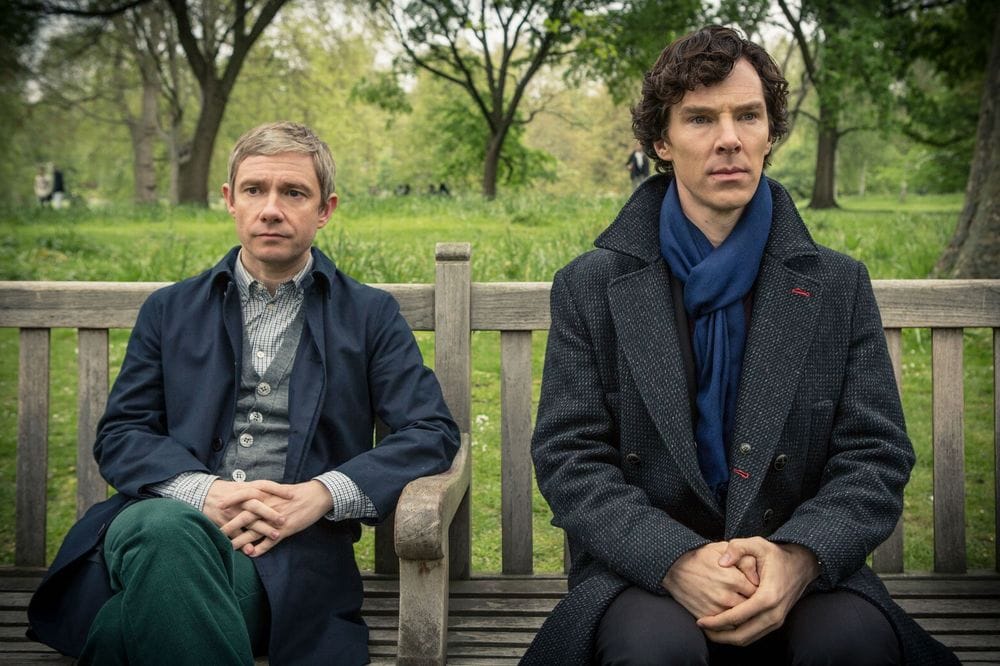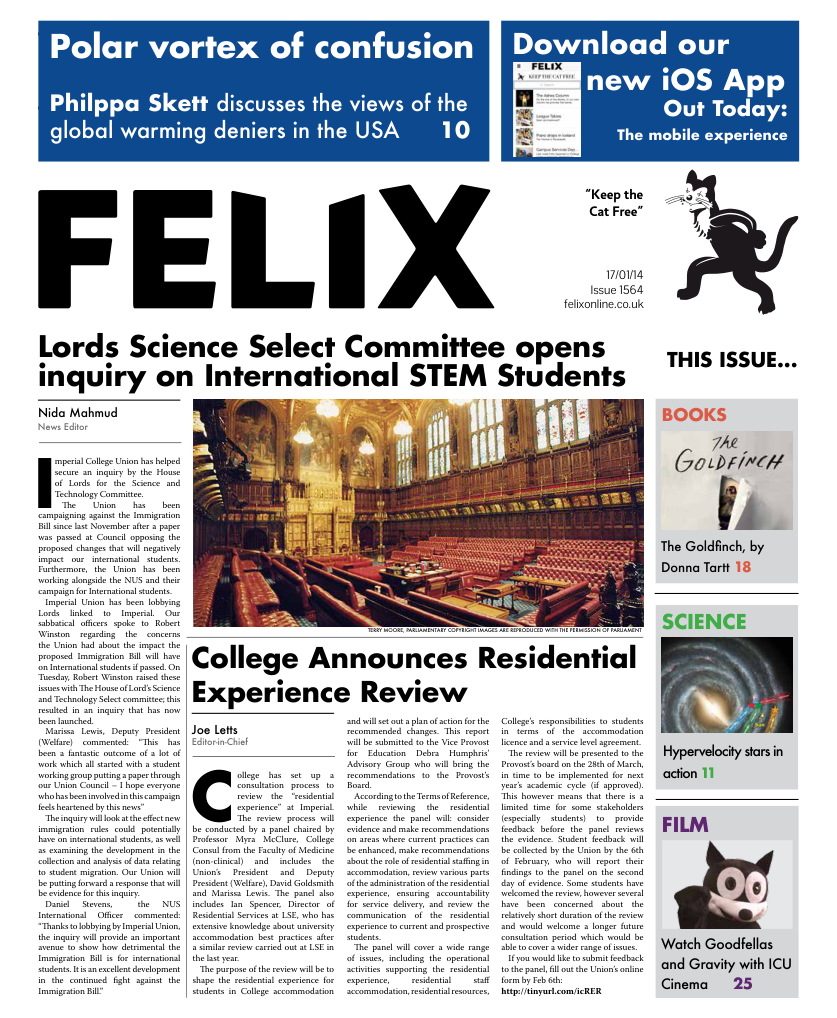The best of festive TV
Maciej Matuszewski reviews two highly-anticipated Christmas specials

SHERLOCK
There must have been few shows in recent memory that were so widely anticipated as series three of Sherlock. The first two series earned themselves a legion of fans for their clever stories, impeccable characterisation and fine acting from leads Benedict Cumberbatch, playing Holmes, and Martin Freeman, playing his friend Watson. The final episode of second season, ‘The Reichenbach Fall’, proved particularly popular, with Holmes having his final confrontation with his nemesis Moriarty and faking his death – the final scene showing that he had somehow survived a fall from the roof of St Bart’s Hospital, despite several witnesses supposedly seeing his dead body.
With two whole years between this and the start of the latest series, fans had driven themselves wild with speculation as to how Sherlock survived. It is therefore quite appropriate that the first scene of the first episode, ‘The Empty Hearse’, purportedly an explanation of how Holmes did it, turned out to be, in fact, a wild theory from a character who is obsessed with proving that the great detective is somehow still alive. Indeed, a major subplot of ‘The Empty Hearse’ is effectively an affectionate satire of fan culture – with the episode showing us a group of Sherlock Holmes obsessives who take turns to present their increasingly outlandish theories of how the our protagonist could have survived. This was a very fun element of the first episode which fortunately distracted somewhat from the fact that the actual explanation turned out to be somewhat pedestrian. It was also an example of the show’s continuing clever and successful efforts to bring the story into the modern era. The first episode, for example, also very briefly touched on the theme of controversial terrorism legislation while the third, ‘His Final Vow’, focussed heavily on Murdoch-style journalistic excesses – all the while remaining true to the spirit of the original Holmes stories.
However, what really made this series of Sherlock so enjoyable is what earned the show its popularity in the first place – its writing. The original Sherlock Holmes stories were known primarily for their meticulously constructed mysteries, and Holmes’ unique ability to solve them. The show maintains this key feature but also goes far further in exploring the characters of Holmes and Watson – building up a powerful study of the relationship between the two men. This is done particularly well in the second episode, ‘The Sign of Three’, which leaves the mystery element somewhat in the background and focuses on Holmes having to deal with acting as best man at Watson’s wedding. Everything – from the pacing, to the plotting, to the brilliantly sharp and witty dialogue – comes together perfectly to show how the two men, despite each often finding the other frustrating, have grown to genuinely care for one another.
While ‘The Sign of Three’ was more introspective, ‘His Final Vow’ was a return to the show’s more traditional tense drama, with Holmes up against master blackmailer Charles Augustus Magnussen. The episode was fast paced, exciting, and filled with twists that, while unexpected, felt very natural and which were, in hindsight, set up well in advance. The ending in particular was done very effectively, drawing on many elements that had been developed earlier in the series and finally presenting Holmes with a true no-win scenario. It was a tragic and poignant sequence that would have served as a fitting finale to the show itself.
That is why I have somewhat mixed thoughts about how the very final scene was a set up for the next series. While I have every faith in the show’s creative team I fear that they may struggle to replicate this series highs. In any case, I hope that this time it will take us less than two years to find out.
DOCTOR WHO: THE TIME OF THE DOCTOR
D_octor Who_ is simultaneously one of the best and one of the most infuriating science fiction television shows out there. I can think of no other show with a premise that has so much potential. With a machine capable of taking our heroes anywhere in time and space, and a protagonist whose face and, to some extent, personality, change every few years, the writers of Doctor Who have the freedom to tell pretty much any story that they want. Yet, throughout its many years, the show has too often been plagued by bad writing and terrible story decisions.
The first few years of Matt Smith’s tenure as the Doctor, and Steven Moffat’s as head writer and executive producer, were, in particular, a very mixed bag. A small number of brilliant episodes, like ‘Vincent and the Doctor’ and ‘The Doctor’s Wife’, couldn’t outweigh an often painfully convoluted metaplot and some of the worst moments in the show’s history – from the simply dreadful ‘The Curse of the Black Spot’, to the offensively bad ‘The Almost People’, to the near incomprehensible ‘The Wedding of River Song’. The most recent series of the show, however, did seem to show some improvement, with most episodes being at least competently written and executed. This, together with a generally enjoyable fiftieth anniversary special in the form of ‘The Day of the Doctor’, made me reasonably hopeful going into this year’s Christmas special, and Matt Smith’s final episode – ‘The Time of the Doctor’.
The episode opens with the Doctor setting off to explore a mysterious planet that has been transmitting an incomprehensible signal throughout all of space and time. However, upon arriving he discovers that the planet is Trenzalore, the world on which he is fated to finally die. With Trenzalore beginning to be surrounded by the fleets of all his enemies, who have also received the signal, he must work to uncover its secret while protecting the planet’s innocent inhabitants.
‘The Day of the Doctor’ certainly didn’t disappoint. Many previous Doctor Who season finales and specials have focused on big threats to the existence of the universe itself – not only making the show repetitive but also making what should have been big events seem cheap and vacuous. ‘The Time of the Doctor’ was a pleasant change in that, while maintaining high stakes, it focused far more on the character of the Doctor himself. Here we see him at his best – fun and eccentric, while also absolutely dedicated to doing right and helping others. The Eleventh Doctor’s ‘death’, of old age after having literally spent centuries protecting the people of Trenzalore, fitted the character perfectly and was executed remarkably well. The episode even managed to tie together most of the loose ends from the Silence plotline, which had been plaguing Matt Smith’s run since his first episode, in a surprisingly satisfying fashion. The use of so many of the Doctor’s classic old enemies, and some surprising old friends, would, in many other episodes, have felt cheap. However, with the themes of the finality and reflection permeating through the entire episode, here it felt very appropriate.
Sure, the obligatory Christmas theme felt tacked on – but then it was not treated as particularly important by episode itself. Sure, there were a lot of plot holes – but by now I’ve gotten tired of complaining about such things when it comes to this show. Sure, it wasn’t the best thing that I’ve ever seen and it doesn’t quite stand up with the true classics of Doctor Who – but it was far better than I could have dared to expect given what had come before. Truly, a fitting farewell to the Eleventh Doctor. With the show now seeming ready to make a fresh start, and with Peter Capaldi taking his impressive acting talents to the role of the Twelfth Doctor, I am quietly hopeful about Doctor Who’s future.





